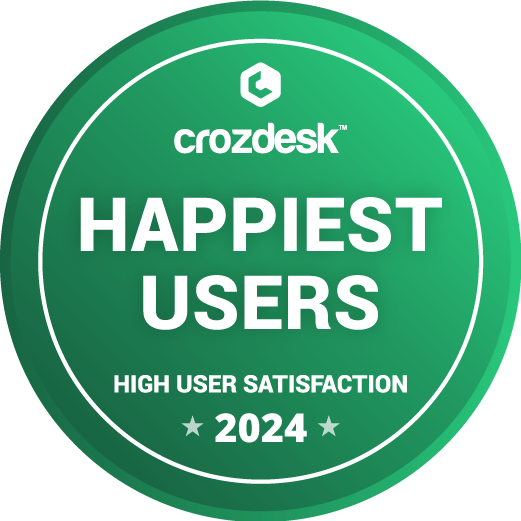It wasn’t a hard choice to select SmartSurvey. Not only did they understand what we were looking to achieve right from the start, they presented a solution that represented everything we needed.
Work Life Balance Surveys
Work Life Balance Surveys

What is work life balance?
Work life balance relates to the equilibrium reached between an individual’s professional responsibilities and personal commitments, and is a key influence on the ability to maintain a healthy and fulfilling lifestyle across both. But in a fast-paced and competitive world the boundary between work and life can easily blur, leading to high levels of stress and burnout among the working population.
The concept involves striking a balance between the time and energy dedicated to work and the time and energy reserved for family, friends, hobbies, and personal pursuits. Work life balance is essential for maintaining good physical and mental health, improving productivity and job satisfaction, and building and maintaining strong relationships with loved ones.
When they can strike the right balance between work and personal life, individuals can lead more fulfilling and rewarding lifestyles, both personally and professionally. Employers should recognise the importance of work life balance and take measures to support their staff members in achieving it, such as offering flexible work arrangements, promoting a positive workplace culture, and encouraging employees to take breaks and prioritise self-care.

Why is a work life balance important?
There are several reasons why work-life balance is crucial.
Physical and mental health
When individuals dedicate an excessive amount of time and energy to their work, they put themselves at risk of developing physical and mental health issues. High blood pressure, obesity, anxiety, and depression have all been shown to result from poor work life balance. Creating a balance between work and personal life enables individuals to prioritise self-care and take care of their well-being.
Personal growth and development
With the time and energy to pursue interests and activities outside of work, opportunities to develop new hobbies and learn new skills emerge. This can lead to personal growth and a sense of accomplishment outside of work, which in turn can lead to increased employee wellbeing and happiness both in and outside of the job. A healthy work life balance allows employees to focus on their personal goals and aspirations in addition to professional ones.
Boosting productivity and job satisfaction
When individuals have the time, energy and opportunity to pursue personal interests and engage in activities outside of work, they return to their jobs feeling rejuvenated and invigorated. This renewed sense of focus and motivation allows them to be more productive and efficient at work. Additionally, employees with a good work life balance report higher levels of job satisfaction and are less likely to experience burnout.
Maintaining relationships
When individuals devote too much time to work, they may neglect their personal relationships with family and friends outside of work, leading to tension and strain and feelings of frustration, guilt or regret. Finding a balance between work and personal life enables individuals to prioritise spending time with loved ones and building meaningful relationships.
Work life balance questions
Your work life balance questionnaire should capture enough information to highlight any areas that need addressing at an individual or company level, and could comprise a mix of satisfaction questions, rating questions, and open text fields to capture feedback in the individuals’ own words. They prove especially useful when run alongside regular employee pulse surveys.
To get you started, here are some examples to use in your next survey, or view our fuller list of work life balance survey questions.
Do you feel that your current work schedule allows you to maintain a healthy work-life balance? (Yes/No)
On a scale of 1-5, how often do you feel overwhelmed or stressed due to your workload?
How frequently do you take breaks during the workday to recharge and refocus?
Do you have the flexibility to adjust your work schedule when necessary to accommodate personal commitments? (Yes/No)
How often do you engage in personal hobbies or activities outside of work hours?
Do you feel that your employer provides sufficient resources and support for maintaining a healthy work-life balance? (Yes/No)
Do you feel comfortable setting boundaries between work and personal life? (Yes/No)
On a scale of 1-5, how satisfied are you with the work-life balance policies and practices in place at your workplace?
How often do you feel that work interferes with your personal life or vice versa?
Do you feel that your employer values work-life balance as an important aspect of employee well-being? (Yes/No)

Tips for work life balance
Maintaining a healthy work life balance is beneficial to both employee and employer, but sometimes easier wished for than achieved. The rise in home working has only made achieving a balance more challenging. Here are some smart ideas that might prove useful, for employees, for their employers, and for home-based workers.
Work life balance tips for employees
1. Prioritise self-care
Take care of your physical and mental health by making time for exercise, for relaxation, and to prepare eating healthy meals.
2. Set boundaries
Establish boundaries between work and personal life. Avoid checking and sending emails or taking work calls outside of work hours.
3. Learn to say no
Don’t take on more work than you can handle. Learn to say “no” and set realistic expectations for yourself and colleagues.
4. Schedule personal time
Make time for family, friends, hobbies, and other personal interests. Schedule this personal time in your calendar, just as you would for your work commitments.
5. Disconnect
Take breaks from technology, such as work-related social media and email, to disconnect from work and focus on personal time.
Work life balance tips for employers
1. Offer flexible work arrangements
Provide staff members with flexible work arrangements such as remote work, flexible hours, and job sharing, to allow employees to balance their work and personal commitments.
2. Encourage breaks
Encourage employees to take regular breaks and to disconnect from work to recharge and avoid burnout.
3. Promote a positive culture:
Foster a positive workplace culture that supports work life balance, such as promoting open communication, recognising and rewarding employees who prioritise self-care, and implementing and promoting work life balance policies.
4. Lead by example
Encourage managers and supervisors to lead by example by demonstrating good work life balance practices and a willingness to prioritise their own self-care; and management benefit from striking a balance no less than the individuals they employ.
5. Provide resources
Offer resources and support to employees such as Employee Assistance Programs, counselling services, and wellness programs, to promote employee wellbeing and work life balance.
Work life balance and working from home
Working from home is an increasingly common feature of our professional lives in recent years, the pandemic seeing companies transition to remote work to protect the safety of their employees and to ensure business operations could be maintained. And many expect the trend to continue. these changes have brought some benefits to employees, such as increased flexibility and the removal of the need to commute.
But striking the right balance between work and personal life is of particular importance when working remotely, and brings its own unique challenges. A lack of separation between work and personal life being key among them.
Furthermore, when working from home, employees may find it challenging to switch off from work and engage in personal time, leading to burnout and increased stress, as individuals struggle to balance their work commitments with personal responsibilities.
Lack of social interaction and a risk of isolation can also occur for some individuals. Home-based workers may find themselves spending extended periods without interacting with colleagues, and this can exacerbate feelings of loneliness and isolation.
To achieve work life balance as a remote worker, it is important to establish a routine that separates work from personal time. In addition to the work life balance tips listed above, here are some additional initiatives to help home workers achieve a better work-life balance:
Establish a dedicated workspace
Create a designated workspace that is separate from personal spaces to help distinguish between work and personal life.
Use your leave
According to research, as many as 62% of UK workers fail to take all of their annual leave. Use holiday entitlement to take breaks throughout the whole year, to allow regular opportunities to recharge and prevent exhaustion and burnout. and switch off completely when on leave.
Maintain social connections
Stay connected with colleagues and friends through virtual meetings and social activities.
Manage distractions
Eliminate distractions by turning off notifications and avoiding social media during work hours.
Communicate with your employer
Communicate with your employer about your work-life balance needs and explore options for flexible work arrangements if necessary.
Create a work life balance survey with SmartSurvey
Create
With a range of design features, SmartSurvey helps you get an employee survey up and running quickly. Wide ranging question types let you build out questionnaires that can capture feedback on any aspect of working life.
Collect
Use flexible survey distribution options to reach your employees wherever they work. All plans offer unique links for easy survey sharing and tracking or you can embed the questionnaire onto a company intranet or website.
Analyse
Get the tools you need to draw out important employee feedback. All our plans let you see survey responses in real-time, and you can use visual summaries to make sense of the data quickly and easily.
How are we different?
UK based
Your data will be stored and processed here in the UK for your peace of mind.
Fanatical support
We pride ourselves on going above and beyond for our customers, providing expert advice and support whenever you need it.
You're in safe hands
Our secure platform and robust data protection measures ensure your data is safe and secure with us. We are ISO27001 and Cyber Essentials Plus certified.
We're human
We understand the importance of personal interaction, which is why we offer a human touch alongside our cutting-edge technology.
Accessibility matters
We're committed to making our surveys accessible to everyone, with a range of features to support those with disabilities.
Unlimited responses
With no limits on the number of responses you can collect, you can be sure your survey will reach as many people as possible without it being cost prohibitive.

Don’t just take our word for it
Over 500,000 users have registered to use SmartSurvey.


We couldn't be happier with SmartSurvey, we love its functionality and flexibility. This means we have been able to use one survey tool across many parts of the business.








Get in touch
We are ISO27001 certified, registered under the Data Protection Act and fully compliant with EU Privacy Laws.
Access to a knowledgeable account manager for personal assistance for when you most need it.
Our friendly design team is on hand to assist with any bespoke design and custom development requests.
We succeed if you succeed. Our goal is to help you carry out effective research and we’re here to help you achieve that.
